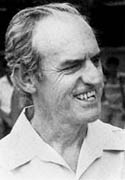 Ignacio Ellacuría, SJ, contributed to Latin American Liberation Theology and was assassinated November 16, 1989, with seven others for their opposition to the El Salvadorian government.
Ignacio Ellacuría, SJ, contributed to Latin American Liberation Theology and was assassinated November 16, 1989, with seven others for their opposition to the El Salvadorian government.
Ellacuría was born in 1930 in the Spanish Basque country. After a Jesuit high school education, he entered the novitiate of the Society of Jesus at the age of 17. Soon after taking his vows, he was missioned to El Salvador where, apart from studies, he lived and worked for the next 42 years.
He studied Humanities and Philosophy at Quito, Ecuador and Theology at Innsbruck, Austria. Ellacuría completed his Doctorate of Philosophy at Madrid and returned in 1967 to El Salvador, where he worked at the University of Central America, becoming rector (president) in 1979.
Ellacuría is regarded as having made a significant contribution to “Liberation Philosophy” which “focuses on liberating the oppressed in order ‘to reach the fullness of humanity.’”1 He is probably best known as one of the principle contributors to Latin American Liberation Theology. He intended “to reflect about faith from the historical present and to reflect about the historical present from faith. According to him, all theology is conditioned by its historical present.”2
Ellacuría did not simply comment on the situation from an academic standpoint. He became directly involved in the lives of the poor through his pastoral work. Reflecting on the situation in El Salvador, he wrote:
Today in our situation the authenticity of the people of God goes by way of poverty and justice: they are the touchstone of the truth of the faith that is professed and of the genuineness of life as it is lived out: poverty, which involves incarnating all our efforts and incarnating ourselves in the reality of the oppressed majorities, and that will necessarily entail a voluntary impoverishment and abnegation on the part of those who wield power; justice, which involves giving to the people what belongs to the people and struggling to uproot injustice and exploitation, and to establish a new earth, wherein the life of the new human may be possible.3
Outspoken in his criticism of El Salvador’s military and the ongoing civil war, Ellacuría was viewed by some as dangerous to social cohesion. On November 16, 1989, he was gunned down by U.S.-trained members of the Salvadoran army at his residence at the university, along with five other Jesuits with whom he lived, their housekeeper, and her daughter.
Related Links
Jon Sobrino, SJDean Brackley, SJ
Transforming Realities: Christian Discipleship in the Soteriology of Ignacio Ellacuría (PDF)
By Michael Edward Lee
In this Notre Dame dissertation, Michael Edward Lee presents the soteriology of Ignacio Ellacuría, SJ, showing the influence of Ignatius of Loyola’s First Principles and Foundation. Lee shows how Ellacuría historicizes Ignatius’s colloquy at the foot of the cross by inviting Christians to stand before the sufferings of crucified people, examine their consciences in the light of that suffering, and enter into the redemptive process of proclaiming and manifesting the Reign of God that promises liberation.
